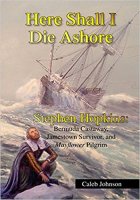 Here Shall I Die Ashore: Stephen Hopkins—Bermuda Castaway, Jamestown Survivor, and Mayflower Pilgrim by Caleb Johnson (Xlibris 2007)
Here Shall I Die Ashore: Stephen Hopkins—Bermuda Castaway, Jamestown Survivor, and Mayflower Pilgrim by Caleb Johnson (Xlibris 2007)
I discovered Caleb Johnson's Mayflower History website while researching for Porter's application for membership in the General Society of Mayflower Descendants. Of the three Mayflower ancestors Porter's family lore put forth as candidates, I chose to pursue Stephan Hopkins soley because that line appeared to be the easiest to document.
MayflowerHistory.com was one of the most interesting sources I found. After some initial skepticism—the value of genealogical information that can be found online ranges from fantastic to abysmal—I recognized Johnson as an authoritative source and entertaining to boot. After proving Porter's descent from Stephen Hopkins to the satisfaction of the Mayflower Society, I gave him Here Shall I Die Ashore for Christmas.
Even before reading the book, I posted a brief summary of Hopkins' life that will give you the gist of his story. But the book is ever so much more than that, a story better told and with more history, context, and detail. I learned a lot I didn't know about the early days of the Jamestown colony in Virginia, and Plymouth in Massachusetts, as well as about Stephen himself.
We all know the Native Americans did not get what they were hoping for out of the arrival of the colonists from England. What I hadn't realized is that nobody involved in these expeditions did. And nobody had a clue how bad the colonists' situations were and how much worse they were going to get. Just when a colony began to (just barely) get a grip on providing food for itself, the folks back in England, frustrated by failed promises of return on their investments, kept sending, not badly-needed supplies, but more hungry mouths to feed. (A number of my own ancestors were on those ships that followed the Mayflower.)
You can't build a healthy colony without women, but women didn't do the kind of work that produced trade goods, so investors were reluctant to allow them to take up space on their ships. It's easy to see the financial backers as heartless, but I'm quite sure most of them were merely clueless. Even in these days of instant communication and near-instant travel, how many of us know what our financial investments—and our charitable contributions—are really doing? And who wouldn't be upset with tenants who don't take care of the property and refuse to pay rent?
Following the initial financial difficulties, long-time Leiden church member and Mayflower passenger Isaac Allerton was appointed to return to England, to start negotiations with the London shareholders and other financial backers. In November 1626, an agreement was reached. The Plymouth colonist-shareholders would purchase the outstanding shares of the company from all the remaining English investors...and assume the colony's debt. The overall adventure was a substantial loss to the London investors—most only got back about a third of their original investment—but the forty-two remaining London shareholders were happy to get out with whatever they could, as most now expected they would eventually lose everything. (pp. 123-124)
Plymouth fared better than Jamestown, thanks to having a population experienced in self-discipline and hard work. Too many of Jamestown's people were of a class accustomed to being served, and whose skills were a very bad mismatch with what the colony needed to survive.
One very important lesson was learned at Plymouth after the ship Anne arrived in 1623, bringing much-longed-for wives, children, and single women.
Up until the Anne's arrival, the Plymouth colonists had worked and farmed collectively; all the crops were brought into a collective company storehouse and then rationed back out to everyone (the employees) in equal allotments. But Governor Bradford and the others soon realized this was not working out as well as had been intended—the productive individuals were getting allotted the same amount as the lazy do-nothings of the colony, and this was killing morale. Bradford's solution: allot everyone their own lots of land, for their own benefit and subsistence. Every person (man, woman and child) received an acre of land, which were logically combined together into larger family plots. (p. 121)
Credit the women, credit free enterprise, or credit finally being out from under the thumbs of clueless managers, but Plymouth finally began to thrive. And so did the Hopkins family.
Most readers will happily stop halfway through the book, where the story of Stephen Hopkins ends. But 115 pages of appendices include much of interest to genealogists and historians, including scholarly articles on the identity and origin of Stephen Hopkins, his descendants to the first three generations, three original-source documents covering Bermuda, Jamestown, and Plymouth, and Stephen's will and estate inventory.


